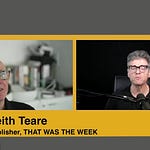Last year, we had a great conversation with Branko Milanovic, author of Visions of Inequality, about how classical economists like Smith, Riccardo, Marx and Pareto analyze inequality. Our guest today, David Lay Williams, asks the same question - but from the perspective of political philosophers like Rousseau, JS Rousseau and Hobbes. In his new book, The Greatest of All Plagues, Williams traces how economic inequality has shaped political theory over the last two thousand years. And in our age of increasingly sharp economic inequalities, Williams reminds us, what Plato called “the greatest of all plagues” is anything but an academic problem.
David Lay Williams is Professor of Political Science at DePaul University. He earned his PhD in Government from the University of Texas at Austin and the author of Rousseau's Platonic Enlightenment (2007), Rousseau's 'Social Contract': An Introduction (2014), and The Greatest of All Plagues: How Economic Inequality Shaped Political Thought from Plato to Marx (2024). He has frequently written on themes in the history of political thought for outlets such as the Washington Post, Bloomberg, The Hill, the Chicago Sun-Times, and Time Magazine, among others.
Named as one of the "100 most connected men" by GQ magazine, Andrew Keen is amongst the world's best known broadcasters and commentators. In addition to presenting KEEN ON, he is the host of the long-running How To Fix Democracy show. He is also the author of four prescient books about digital technology: CULT OF THE AMATEUR, DIGITAL VERTIGO, THE INTERNET IS NOT THE ANSWER and HOW TO FIX THE FUTURE. Andrew lives in San Francisco, is married to Cassandra Knight, Google's VP of Litigation & Discovery, and has two grown children.













Share this post